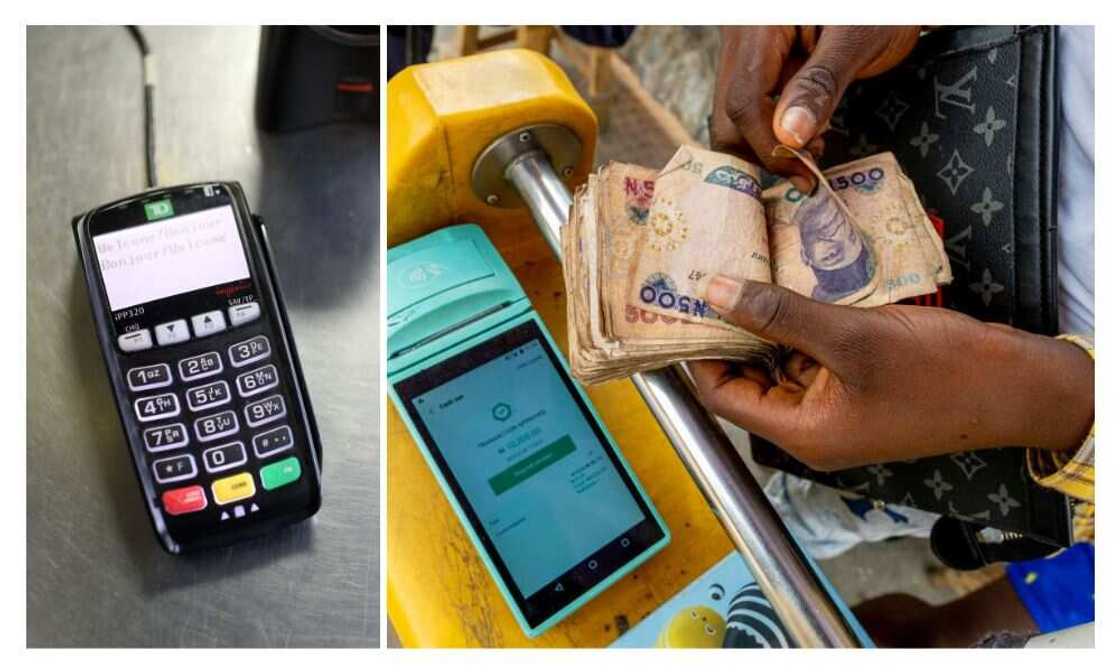"PoS Charges:" OPay, MoniePoint, PalmPay Battle for PoS Market as Merchants Stretch Bank Agents
- New entrants are threatening the Point of Sale businesses into the space originally meant for them
- Merchants are reportedly taking up the spaces meant for bank agents offering PoS services
- This is as three leading operators in the industry have reported an uptick in PoS issuance in Nigeria recently
The emerging Point of Sale (PoS) market in Nigeria has seen some of the most prominent players in the industry lock horns and vie for customers' attention.
PoS operators are facing massive threats as merchants entered the territory that was once the forte of bank agents and shrank their market share.

Source: Getty Images
FG foils attempt by PoS operators to hike charges
The move led the Federal Competition and Consumer Protection Commission (FCCPC) to demand the immediate reversal of the fee hike. It threatened to slam them with a fine for violating its cease-and-desist order.
PAY ATTENTION: Share your outstanding story with our editors! Please reach us through info@corp.legit.ng!
Following the FCCPC threat, leaders of the agents' association under the aegis of Mobile Money and Banking Agents (AMMBAN) said the rugged business terrain made the fee hike a necessity.
AMMBAN released price adjustments for different transactions, which riled the public against the operators.
According to many agents, high inflation in Nigeria is to blame. Still, they also highlighted another threat—the foray into their territory by merchants threatening to throw them out of business.
At the height of the cash crisis in Nigeria, caused by CBN's naira redesign policy, bank agents or PoS operators held sway and increased charges by as high as 30%.
Many agents say they grapple with inflation and growing competition eating away at the little they make.
BusinessDay reports that merchants and agents share parallels because they are both in the business. The difference is in the products and services they offer.
Leading players go for Nigerians' pockets
While agents are cash-in-cash-out merchants selling cash, merchants are used in business to sell goods and services like petrol stations, schools, hospitals, market traders, and supermarkets.
The big players such as MoniePoint, PalmPay, Parkway, and Opay have reported an increase in merchants creeping into the spaces of money agents.
MoniePoint, a relatively new entrant, said before 2023, bank agents dominated the terrain, accounting for 80% of PoS issuance on its platform.
Moniepoint reportedly serves 1.3 million businesses, and PalmPay celebrated 25 million users recently and said they are charged for the future.
Opay said it has 35 million registered app users and about 500,000 agents in Nigeria who rely on the platform to send and receive money.
The battle of wits among the top players in the industry is not just starting but is well underway, and Nigerians are the primary targets.
Everything you need to start PoS business in 4 simple steps as number of bank accounts hit 191.4m
Legit.ng reported that Point-of-sale (POS) business is gradually becoming one of the most lucrative or profitable businesses, and more Nigerians are turning to it amid rising unemployment and a growing number of bank accounts.
According to Nigeria Inter-Bank Settlement System Plc (NIBSS), there are 191.4 million bank accounts in the country, out of which 133.5 million are active as of December 2021.
The breakdown of bank accounts NIBSS said is 49.8 million current accounts, 120.4 million savings accounts, 8.9 million corporate accounts and 179.2 million individual accounts.
Source: Legit.ng


